Hola! (Hello!) and Welcome to our Guide to Spanish Culture, Business Practices & Etiquette
Spain is a complex cultural mix. Although many consider themselves 'Spanish', many also consider themselves a Catalan, Basque or Galician first.
What will you Learn in this Guide to Spain?
You will gain an understanding of a number of key areas including:
BUY AN IN-DEPTH INSIGHT REPORT ON SPAIN
For those needing a more detailed and comprehensive overview of Spain we have published an expert Report on Spanish Society, Culture & Business.

The 52-page document has been authored by one of our Spain country specialists and provides readers with much more detail that our free guide above.
Topics include:
- An introduction to the country, its history, politics, people and culture
- Insights into the country’s values, customs and etiquette
- Tips on preparing to work with new colleagues from Spain
- Expat-orientated information on daily life
- Guidelines and tools on adapting and dealing with cultural differences
Buy for Only $7.
Order via the button below to receive your Spain Insight via email or read more before buying.
Skip to a section or scroll on:
STEREOTYPING
Remember this is only a very basic level introduction to Spanish culture and the people; it can not account for the diversity within Spanish society and is not meant in any way to stereotype all Spanish people you may meet!
FACTS AND STATISTICS
- Location: Southwestern Europe, bordering the Mediterranean Sea, North Atlantic Ocean, Bay of Biscay, and Pyrenees Mountains; southwest of France
- Capital: Madrid
- Flag: There are two red horizontal bands top and bottom of the flag with a wider (double the width) yellow band between them. The national coat of arms is displayed on the hoist side of the flag in the yellow band and represents the four tradition kingdoms of the country; going clockwise from the top left: Castile (represented by a castle), Leon (represented by a lion), Aragon (represented by red and yellow stripes) and Navarre (represented by linked chains). The Moorish kingdom of Granada is represented by a pomegranate fruit at the bottom of the shield. Either side of the shield are the mythological pillars of ‘Hercules’ and the shield is topped by a crown. The flag of Spain is known as ‘la Rojigualda’.
- National anthem: The national anthem of Spain is known as – martfa re’all – ‘Royal March’ and is one of the few anthems in the world to have no official lyrics.
- Nationality: Spanish
- Ethnic Make-up: The ethnic groups in Spain are: Castilian (approx. 75%), Catalan (approx. 16%), Galician (approx. 6.5%) and Basque (approx. 2%.)
- Population: 46+ million (estimated 2019)
- Population growth rate: 0.01%
- Climate: temperate; clear, hot summers in interior, more moderate and cloudy along coast;
cloudy, cold winters in interior, partly cloudy and cool along coast
- Time Zone: Spain has two time Zones – Central European Time (GMT + 01.00) and daylight saving time – Central European Time (GMT + 02.00). The Canary Isles however, keep Western European Time with GMT + 00.00) and daylight saving time is observed from the last Sunday in March until the last Sunday in October.
- Currency: The currency in Spain is the Euro
- Government: The Government in Spain is a Constitutional Monarchy. The King is the head of state and commander-in-chief but does not have extensive powers in Government.
- Business Culture: Ranked 10th in The Business Culture Complexity Index™
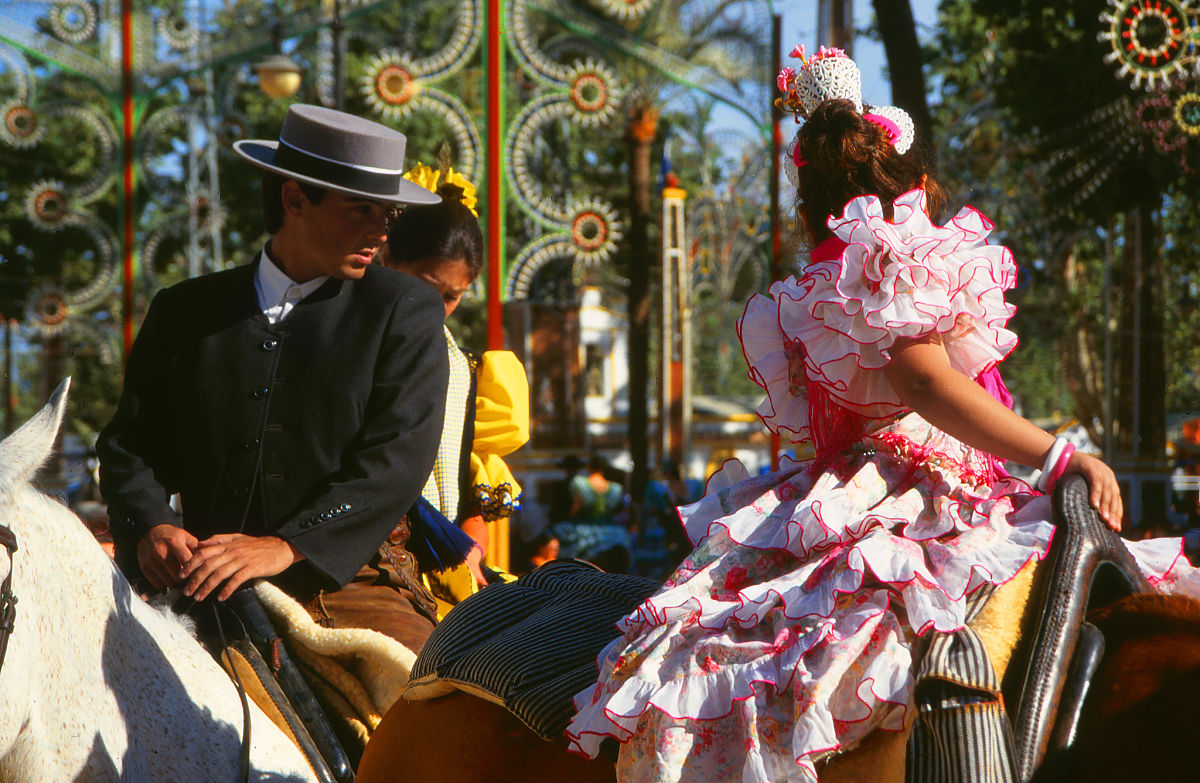
Riders in a horse festival in Andalucia cross paths. Religious festivals and parades are also very common. Photo by Dominic Alves on Flickr (CC BY 2.0)
BASIC INTRODUCTION TO SPAIN
Spain’s powerful empire began when Columbus ‘discovered’ the Americas in 1492 which led to the colonisation of most of South and Central America, Mexico, parts of the Caribbean and much of what is now the USA.
During the 16th and 17th Centuries the Spanish lost command of the seas to England and subsequently struggled to embrace the industrial and mercantile revolutions taking place over the next century. Spain subsequently began to lag behind Britain, France and Germany both politically and economically.
The country suffered enormous hardship during the civil war which raged between 1936 and 1939 and resulted in thirty six years of military dictatorship by General Francisco Bahamonde (Franco). It was not until 1975, following the death of Franco, that Spain was able to establish a peaceful and democratic society which saw a rapid growth in modernisation and the economy.
They joined the European Union in 1986 and became a world-wide leader in freedom and human rights.
In 2008, Spain suffered a catastrophic economic recession but has begun recovery showing three years of GDP growth above the EU average. Although their unemployment record has fallen it remains high particularly among the young people of Spain.
LANGUAGE IN SPAIN
The official language in Spain is Spanish or Castilian Spanish.
At least 90% of the population speak Castilian Spanish as a first or second language.
About 17% of the population speak Catalan, 7% speak Galician and 2% speak Basque.
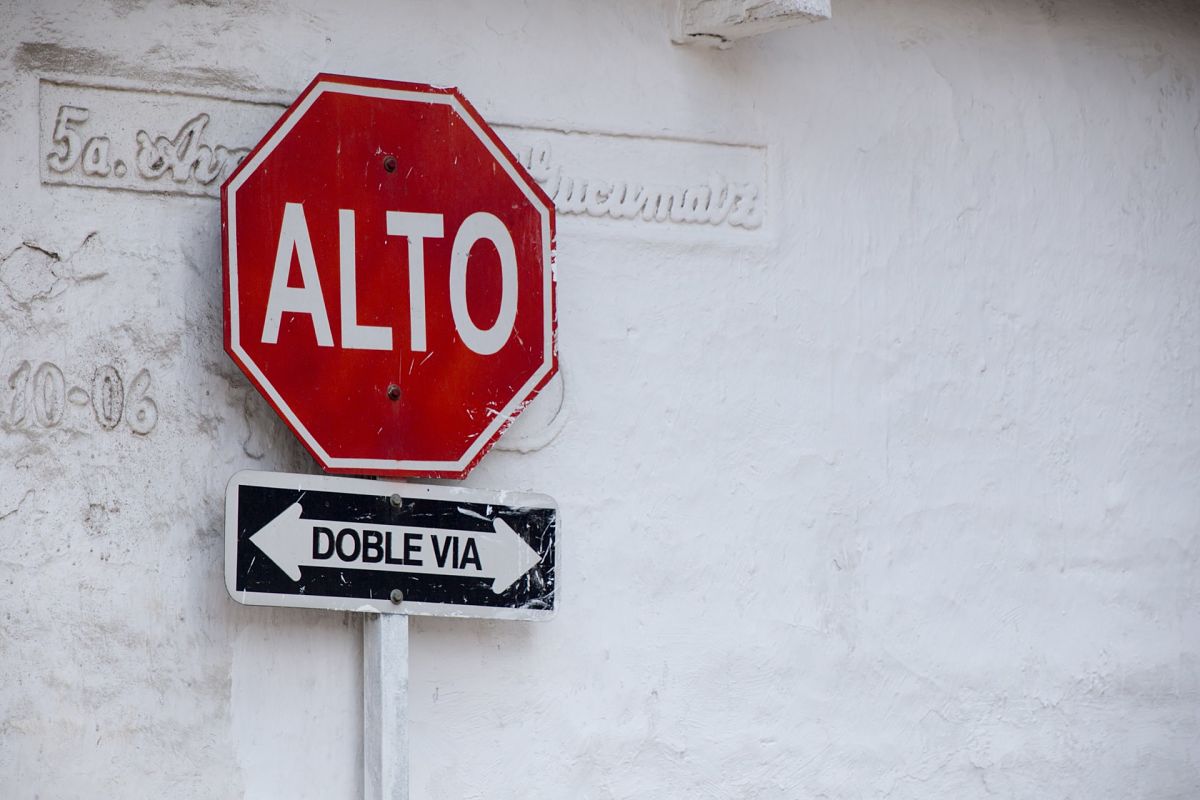
Spanish is now spoken around the world due to the Spain's colonialist past. Photo of street sign in Guatemala by Florida-Guidebook on Unsplash
SPANISH CULTURE & SOCIETY
Religion & Beliefs:
- Spain is a predominantly Roman Catholic country with approximately 94% of the population affiliated to that religion.
- During the history of Spain, there have been long periods where different religious groups have coexisted, including Muslims, Jews and Christians.
- Some traditions are more a cultural event rather than a religious one.
- During Holy Week, processions take place when participants wear a capirote which is a pointed hat of conical form and is part of the uniform of some brotherhoods and fraternities. They walk barefoot and carry a burden which is symbolic of a penitent.
- Religious history is apparent in every small town, where the most grandiose building is typically the church. In the large cities the Cathedrals are almost museums.
Major Celebrations/Secular Celebrations:
Many of the holidays in Spain are based on religion. Some of the holidays are national throughout Spain and marked (N) others are regional (R)
- January 1: New Year’s Day (N)
- January 2: Monday after New Year's Day (R) – Andalucía, Aragón, Asturias, Castilla and León, Murcia and Melilla.
- January 6: Epiphany / Three Kings' Day (N)
- February 29: Day of Andalusia (R)
- March 1: Day of Balearic Islands (R)
- March 20: Monday after Saint Joseph's day (R) – Extremadura and Madrid.
- The most important period of celebration in Spain is Holy Week (Semana Santa), the annual tribute to the Passion of Jesus Christ. As in all countries that celebrate Easter, the dates vary each year between the last two weeks of March to the first two weeks of April. The holidays are: Maundy Thursday - (R) – all regions excluding Catalonia, Good Friday (N) Easter Sunday (N), Easter Monday (R) – Balearic Islands, Basque Country, Catalonia, La Rioja, Navarre and Valencia.
- April 24: Day of Aragon / Day of Castile and Léon (R)
- May 1: Labour Day/Worker's Day (N)
- May 2: Day of Madrid (R)
- May 16: Whit Monday or Pentecost Monday (R) – Catalonia
- May 17: Galician Literature Day (R)
- May 30: Day of the Canary Islands (R)
- May 31: Day of Castilla-La Mancha (R)
- June 9: Day of Murcia / Day of La Rioja (R)
- June 15: Corpus Christi (R) – Castilla-La Mancha
- June 24: St John's Day (San Juan) (R) – Catalonia.
- July 25: St James' Day (Santiago Apostol) (R) – Basque Country and Navarre.
- July 28: Cantabrian Institutions Day (R) – Cantabria
- August 15: Assumption of Mary (N)
- September 1: Festival of Abraham’s Sacrifice (R) – Ceuta and Melilla.
- September 2: Day of Ceuta (R)
- September 8: Day of Asturias / Day of Extremadura (R)
- September 11: Day of Catalonia (R) – marks the anniversary of the recapture of Barcelona in 1714.
- September 15: Day of the Bien Aparecida (patron saint) (R) – Cantabria
- October 9: Day of Valencia (R) – commemorates King James I entering the city of Valencia to free it from Moorish rule in 1238.
- October 12: Spain's National Day / Columbus Day – commemorates when Columbus landed in the New World in 1492 (N)
- November 1: All Saints’ Day (Fiesta de Todos los Santos) (N)
- December 6: Spanish Constitution Day (N)
- December 8: Immaculate Conception (N)
- December 25: Christmas (N)
- December 26: Saint Stephen's Day (R) – Catalonia.
The Family:
- Traditionally, the family has been the basis of the social structure, including the nuclear and the extended family, which provide both social and financial support.
- Although it has become less common over the past few decades for extended family to share the same home, familial ties remain a very important aspect of Spanish society.
- The structure and size of a traditional Spanish family has changed over time. People are living longer and having less children.
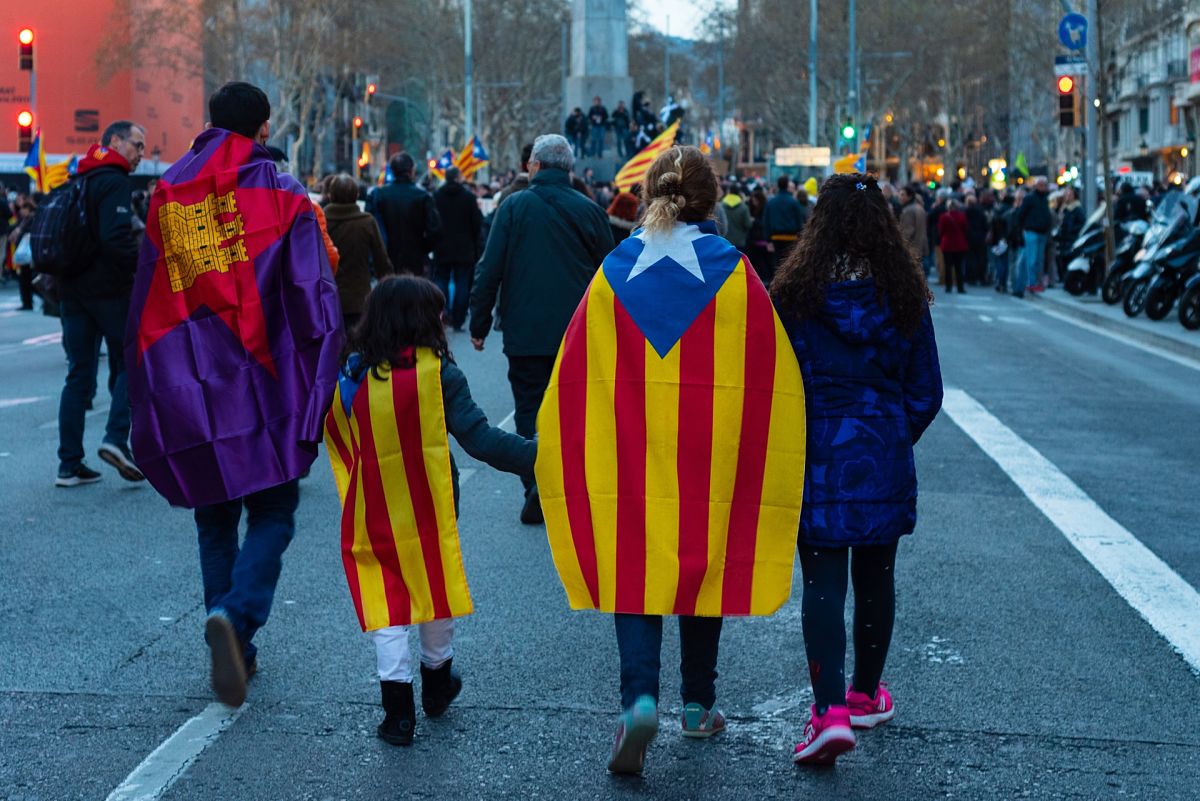
'Catalonia is not Spain' is something you may hear some Catalans shout at demonstrations. It is important to understand the strong regional cultures and identities that exist in Spain. Photo by Külli Kittus on Unsplash
Social Stratification:
- Historically, the royal family is at the top of the social strata in Spain which is embodied by the titled nobility and aristocracy. However, in the expansion of a modern, democratic society, the boundaries between the traditional upper classes have widened with social standing measured by achievement in areas of business, culture and public services.
- New wealth coupled with a burgeoning middle class play a significant role in the stratification of Spain. The old traditions relating to the nobility clinging to power and having no involvement in manual labour and commercial activity have long since passed and many members of the nobility now work in middle-class professions.
- The social stratification of Spain is now very much based upon US/European concepts of class, wealth and upward mobility.
Gender Roles:
- Traditionally women in Spain were the homemakers and men provided for the family. However, in the last two decades, women’s role in Spanish society has changed dramatically and many more are entering university education and moving into professions which were formerly dominated by men. Young, unmarried women have become more independent and are migrating to cities for education or work.
- Inheritance laws have paved the way in the last few decades to bring equality for both sexes. However, issues have arisen for the royal family and nobility in Spain regarding a recent change in law appertaining to the inheritance of titles and property which prevent a son from taking precedence over an older sister. There is some rebellion demanding the law be dropped and returned to the former male dominated hierarchy of inheritance.
- As far as family is concerned in modern Spain, men and women tend to share the parenting and household responsibilities particularly in urban areas where more women are likely to work outside the home in the cities. In the rural farming areas, the tradition of women as the homemakers tends to be more obvious although women and men often share the labour on the land in support of one another.
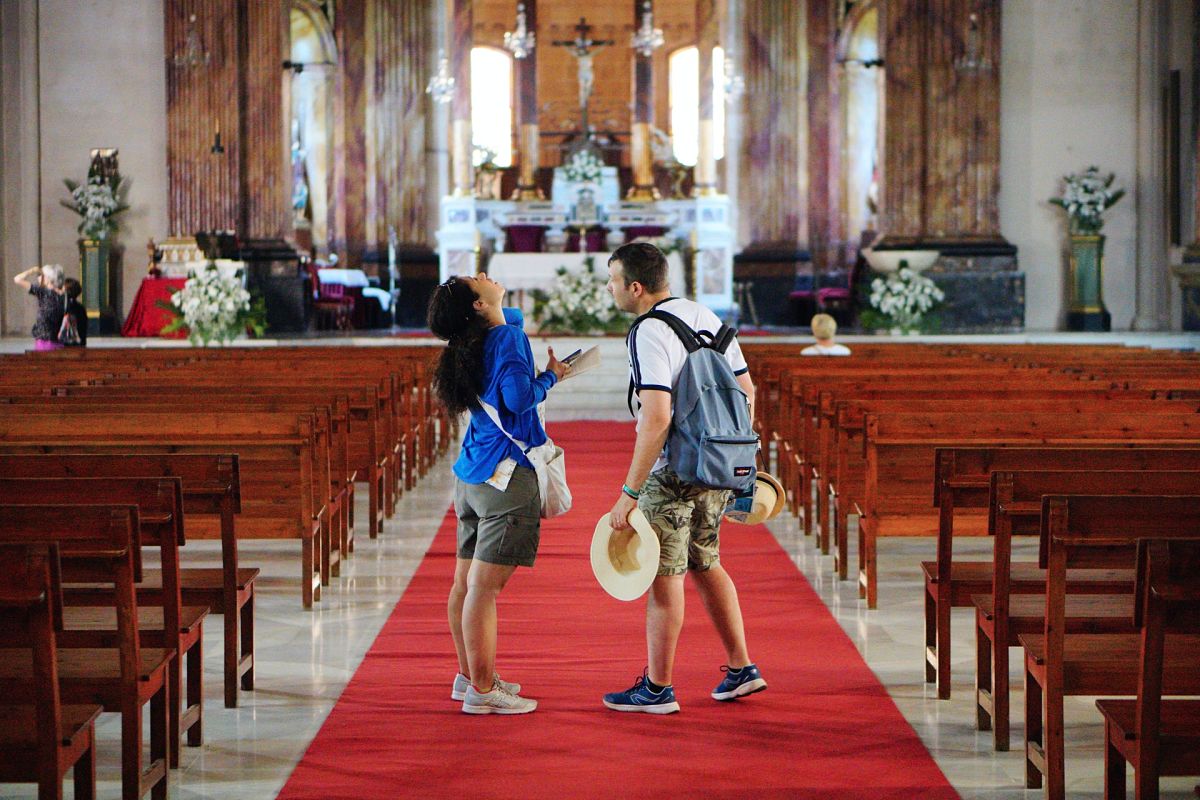
Catholicism has a big influence over Spanish culture and life. Photo of church in Menorca by Alan Findlay on Unsplash
Socialization:
- Children in Spain are highly prized and doted upon by parents and extended family. They are raised to have respect for their elders and to observe family values and obedience.
- The education of children is compulsory between the ages of six and sixteen but nursery and pre-school facilities are widely available. Pre-school begins from 0-3 years of age and the next phase is for children aged between 3 years and 6 years whereby they enter primary school. This consists of six academic years from 6 years of age through to 12 years. Secondary education then takes places between the ages of 12 and 16.
- Once children have completed their secondary compulsory education (ESO) they have three choices: they can either enter the work force, go into further education via High School which is known as the Spanish Baccalaureate or embark upon Vocational training.
Economy :
- Unemployment rate: 17.8% (Apr 2017) Eurostat
- GDP per capita: 26,528.49 USD (2016) World Bank
- Gross domestic product: 1.232 trillion USD (2016) World Bank
- Government debt: 99.4% of GDP (2016) Eurostat
- GDP growth rate: 3.2% annual change (2016) World Bank
Food:
- Spain is a large country with many regions each having their own version of traditional cuisine. With miles of coast, it is not surprising that many dishes feature seafood.
- The Spanish are particularly famed for their Paella, a recipe which is said to have its origins in Valencia which lies on the south eastern coast. The dish is rice based and includes a mixture of vegetable, meat and fish. It is seasoned with saffron and various spices.
- Another favourite is the Tapas, which is an assortment of appetizers which may be hot or cold. A typical Tapas can involve: Chorizo, Patatas bravas (pieces of potato fried in oil and served in a tomato sauce), spicy lamb meat balls, deep fried calamari, grilled artichoke, aubergine.
- Tortilla espanola (omelette made with potatoes and onions) is very popular throughout Spain.
- Pincho is a traditional small snack similar to tapas and is particularly popular in northern Spain. It is usually eaten in bars whilst socialising with friends and family.
Arts, Humanities & Popular Culture:
Spain has a long history of art and culture which was severely affected during Franco’s dictatorship – (1939-1975) when many artists were forced to pursue their craft in exile.
There is enormous pride and interest in the heritage of Spanish art and the Spanish government support all forms of art and humanities which are reflected in their museums, universities and professional academies.
- Antoni Gaudi (1852 – 1926) made his mark on Spain, particularly in and around Barcelona with his creative contribution to architecture. His style was distinctive and eclectic and included the famous basilica La Sagrada Familia.
- Spain has produced many famous artists: Picasso, Dali, Goya, Velázquez, el Greco – to name but a few.
- In the field of literature, Spain’s history has been well documented in the written word from medieval times including the cantar de mio cid – a poem dating back to the 12th Century,
- The story of Don Quixote penned by Miguel de Cervantes Saavedra and published in 1605 remains as popular today as it was then. It is an adventure which was made into a movie in 2000.
- Numerous works have been written about the Spanish Civil War which raged from 1936 to 1939.
- Throughout Spain’s history one of the most traditional forms of music is the iconic Spanish Guitar music played at family and cultural celebrations across the country.
- Of all the traditions of music and dance in Spain, the most famous and popular is the Flamenco guitar that accompanies another traditional and popular art form, the Flamenco dance.
- The female traditionally wears a flouncy red dress and dances to the music holding in her hand castanets, (small concave pieces of wood in two parts joined by chord) which are clicked as the dancer twirls and stamps her feet.
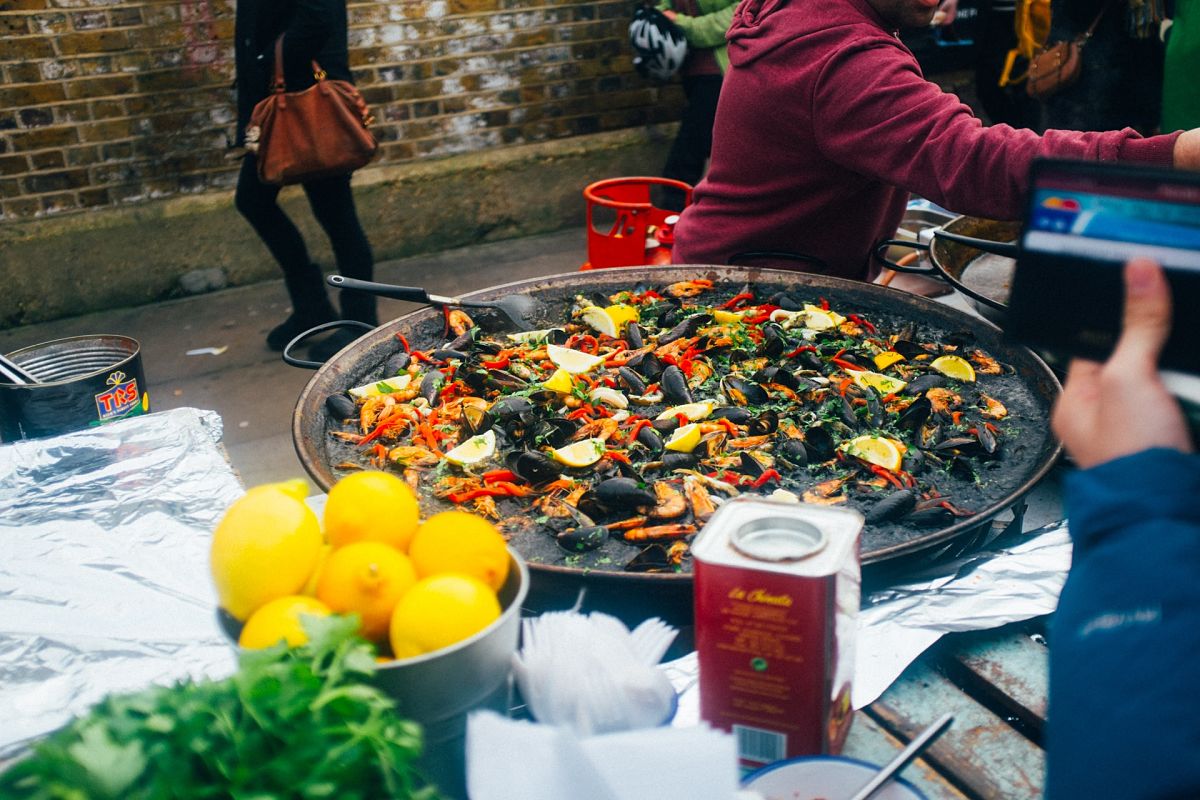
Paella - the quintessentially Spanish dish. Photo by Jay Wennington on Unsplash
SPANISH SOCIAL CUSTOMS & PROTOCOL
Naming conventions:
- Children in Spain are given a first name which is then followed by the paternal surname and then the mother’s surname.
- There is no concept of a middle name although the first name is sometimes a composite of two names - eg: José Luis
- Women do not change their name when they marry.
Meeting & Greeting:
- When introduced expect to shake hands.
- Once a relationship is established, men may embrace and pat each other on the shoulder.
- Female friends kiss each other on both cheeks, starting with the left.
- People are often referred to as Don or Dona and their first name when in formal occasion as a general rule.
- Many men use a two-handed shake where the left hand is placed on the right forearm of the other person.
Communication style:
- Communication regarding business relationships is often quite formal and incorporates strict rules of protocol.
- Any form of confrontation is not acceptable and should be avoided.
- Spanish people are proud and very protective of their standing and how others perceive them.
- Boasting of achievement and personal accomplishment should be avoided.
- Spanish people tend to be extrovert and friendly as is typical in Mediterranean culture and they place modesty and personality foremost to professional or business success.
- Most young people in Spain are fluent in or at least have a good understanding of English but some older people may require the use of an interpreter.
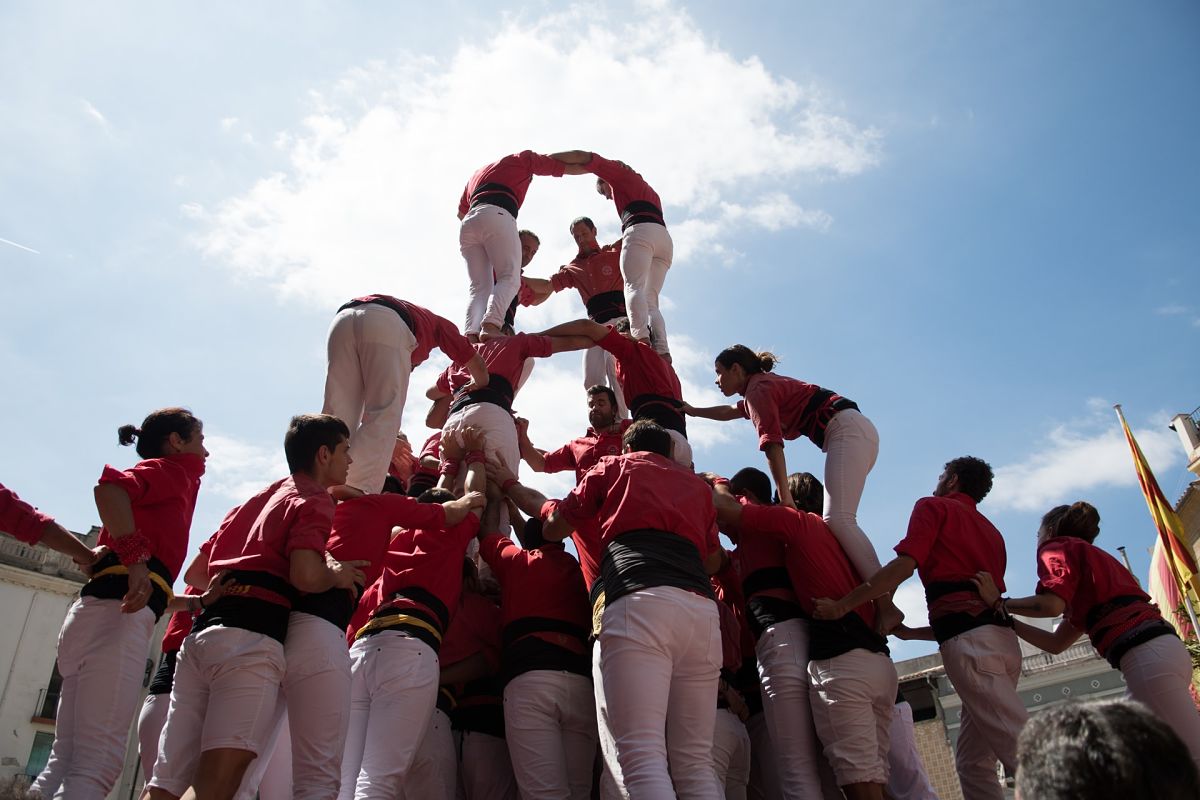
Forming a human tower at a festival in Igualada. Photo by Michał Parzuchowski on Unsplash
Personal Space:
- Spanish people are open and friendly.
- In an informal situation whether with family close friends or virtual strangers they greet women with a kiss on each cheek.
- Men have no fear of personal space with other men in an informal situation and they will often greet or say good-bye with a hug (abrazo).
Gift Giving:
- When invited to a home for dinner it is customary to give the host or hostess a gift: a good bottle of wine, flowers, chocolates and/or a dessert.
- It is especially good to ensure the gift is beautifully wrapped.
- It is not advisable to give chrysanthemums, white lilies or red roses and flowers should be in odd numbers except for 13 which is seen as an unlucky number.
- If the hosts of the dinner party have children it is considered good etiquette to take a small gift for them.
- If receiving a gift it should be opened immediately in the presence of the giver.
Dining & Food:
- Remain standing until invited to sit down. You may be shown to a particular seat.
- Always keep your hands visible when eating. Keep your wrists resting on the edge of the table.
- Do not begin eating until the hostess starts.
- Use utensils to eat most food. Even fruit is eaten with a knife and fork.
- If you have not finished eating, cross your knife and fork on your plate with the fork over the knife.
- The host gives the first toast.
- An honoured guest should return the toast later in the meal.
- It is acceptable for a woman to make a toast.
- Indicate you have finished eating by laying your knife and fork parallel on your plate, tines facing up, with the handles facing to the right.
- Do not get up until the guest of honour does.
Taboos:
- Do not talk about religion. The Spanish have a strong sense of religious pride.
- Do not expect dinner in the evening to be any time before 9pm.
- Do not plan anything for a Tuesday 13th as this is seen as an unlucky date.
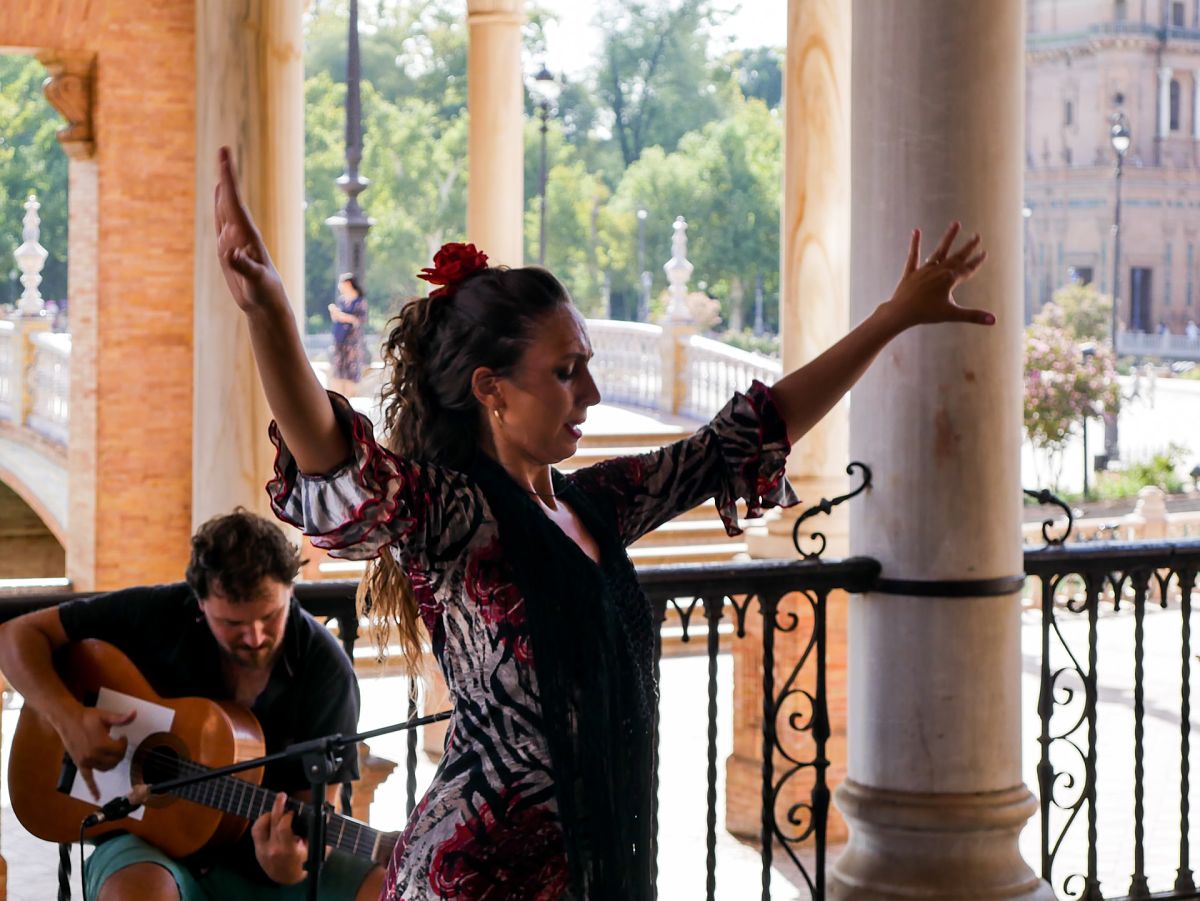
Strike a pose - A flamenco dancer in Seville. The dance comes from the music traditions of Southern Spain in the areas of Andalusia, Extremadura and Murcia. Photo by V2F on Unsplash
SPANISH BUSINESS CULTURE & ETIQUETTE

If you are doing business with the Spanish or relocating to Spain for work, why not invest in some customized cultural awareness training?
What to wear:
- Business dress is stylish yet, conservative.
- Dress as you would in the rest of Europe.
- Elegant accessories are important for both men and women.
Business cards:
- Present your business card to the receptionist upon arriving.
- Have one side of your card translated into Spanish.
- Hand your card so the Spanish side faces the recipient.
Titles:
- First names only are used when addressing family, friends and children.
- In business settings, it is recommended that you address your counterparts with ‘señor’, ‘señora’ or ‘señorita’ for men, women or unmarried women respectively.
- When addressing a professional then use titles where appropriate (e.g. doctor / professor).
- It is not necessary to use titles however, when addressing Spanish business counterparts.

Photo of the Four Towers Business Area in Madrid, by Octavian Rosca on Unsplash
Meetings:
- Appointments are mandatory and should be made in advance, preferably by telephone or fax. Reconfirm in writing or by telephone the week before.
- You should try to arrive on time for meetings.
- The first meeting is generally formal (although can often seem more relaxed than in other western business meetings.) and is used to get to know one another. Do not be surprised if no business is actually conducted during the first meeting.
- Agendas are often used but not always and they are not always strictly adhered to.
- Make sure all your printed material is available in both English and Spanish.
- Not all businesspeople speak English, so it is wise to check if you should hire an interpreter.
- Several people may speak at once. You may be interrupted while you are speaking although this should not be seen as an insult. It often means that they are interested in what you are saying.
- Decisions are not necessarily reached. Meetings are for discussion and to exchange ideas.
- Most Spaniards do not give their opinion at meetings. Therefore, it is important to watch their non-verbal communication.
Negotiation:
- Spaniards place great importance on the character of the person with whom they do business.
- Hierarchy and rank are important. You should deal with people of similar rank to your own.
- Decision-making is held at the top of the company, since this is a hierarchical country. You may never actually meet the person who ultimately makes the decision.
- Spaniards do not like to lose face, so they will not necessarily say that they do not understand something, particularly if you are not speaking Spanish. You must be adept at discerning body language.
- Spaniards are very thorough. They will review every minute detail to make certain it is understood.
- First you must reach an oral understanding. A formal contract will be drawn up at a later date.
- Spaniards expect both sides to strictly adhere to the terms of a contract.
Do you need to cite this page for school or university research?
Please see below examples.
Simply change the country name depending on which guide you are referencing.











